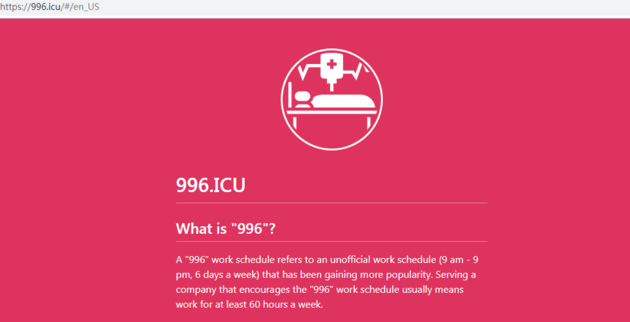
Photo/Shetuwang
Mar. 28 (NBD) – Chinese coders have found a new way to use GitHub—accusing the long working hours rampant in the country's tech industry.
Several days ago a web link "996.icu" was posted on GitHub, and within one hour the page won over 1,000 stars. By press time the number soared to over 56,000 and is still rising, leading some to claim that the stars of the repository increase most rapidly in the history of GitHub.
The speed is a reflection of the complaints that emloyees in tech companies have had for a long time under the so-called 996 work schedule, which refers to "9 a.m. to 9 p.m., 6 days a week". The latter part of the link, icu, means burnout from work could send an employee directly to intensive care unit (ICU).
A user by the name of "nulun" on tech-centered community V2EX said he/she realized how "destructive" 996 is to his/her life after the company adopted the schedule recently, so nulun registered the domain name.
On the page nulun cited articles in China's labor law which set working hours to 8 hours on workday and no more than 44 hours in a week on average, as well as specific requirements on overtime pay.
Nulun then concluded the fair salary of an employee under the 996 schedule should be 2.275 times of his or her current pay, if the labor law is strictly followed.
The author named several tech companies for implementing such long working hours, including classified advertisements site 58.com, e-commerce giant JD.com, and WeChat-based third-party shop platform Youzan.
The page ends with a powerful slogan—"Developers' lives matter".

Photo/Screenshot of 996.icu
Sympathetic workers flooded to the issues section of the repository, which currently accumulated over 5,000 comments. One of them reads, "After I left a '996' company I felt like just out of prison when standing in the street and amazed at how streets look like in the daytime."
Some users started a poll in the section to expose companies or departments that adopt the 996 schedule.
Work overload is nothing new in China's tech industry, but recent publicity of the unwritten convention, and especially the blunt rhetoric of employers, have sparked widespread outcries.
Hanghzou-based Youzan announced at its annual meeting on January 17 that the company would officially set working time from 9:30 a.m. to 9 p.m., and six work days a week became compulsory.
CEO Baiya responded that it is "definitely a good thing" for being honest about the company's culture in retrospection in a few years.
Last month employees revealed on social networks that JD.com was applying a similar 995 schedule without overtime pay. Liu Li, PR director of the company's fast consumption business group responded that overtime is not compulsory, but the company encourages workers to "fully dedicate to work" with "endavour and passion" to create more values for clients as well as themselves and their families.
The fast-growing ByteDance, operator of TikTok, implemented a "big/small week" policy which requires employees to work on Sundays every two week. The policy is regarded as essentially similar to the 996 schedule.
Under the 996 schedule it seems impossible to strike a work-life balance. On March 20 the Hong Kong-based South China Morning Post reported the struggles of tech workers in tech zones of Beijing.
The article included an entrepreneur suffering from chronic insomnia, a young couple who couldn't find time or energy to conceive a child, and a young woman who had to give up entertainment in downtown Beijing because she lived near her company in a remote tech area to cut commuting time.
"No sleep, no sex, no life", the report summed the conditions of many tech workers in the title.
Email: limenglin@nbd.com.cn


 川公网安备 51019002001991号
川公网安备 51019002001991号





